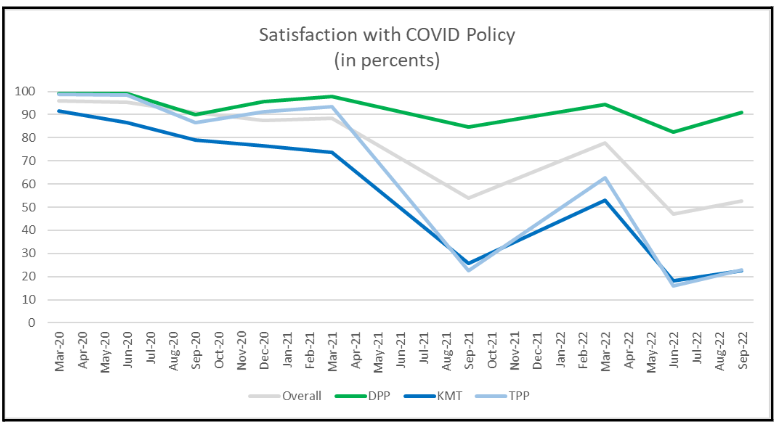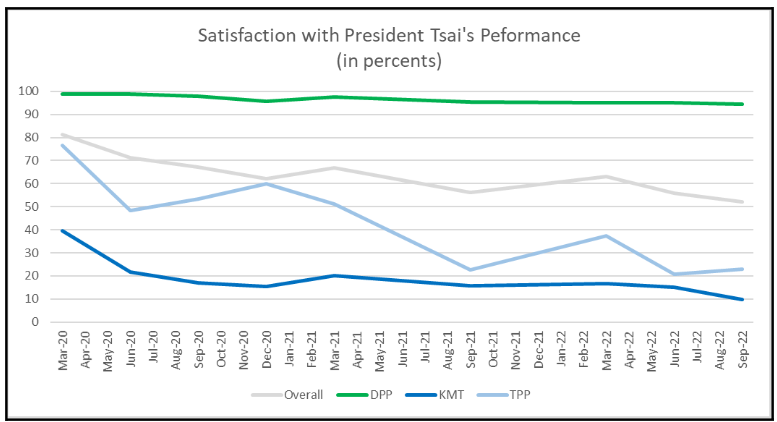Taiwan’s initial handling of the COVID-19 pandemic garnered considerable international attention, with President Tsai Ing-wen (蔡英文) listed in 2020’s Bloomberg 50 as “Taiwan’s COVID Crusher”—and others suggesting that Taiwan’s pandemic policies could have implications for relations with China. Taiwan’s success has been attributed to various factors, including cooperation across levels of government and citizen groups, early and repetitive news coverage, broad compliance with social distancing and mask use, cultural factors prioritizing the collective good versus individualism, and strong isolation and quarantine policies.
Yet, attention to Taiwan’s early successes has consistently failed to acknowledge changing perceptions within the country, especially as Taiwan saw COVID-19 cases rise throughout 2022. By October 2022, when Taiwan lifted tourist restrictions, the country had confirmed over 7.5 million cases and 14,000 deaths, the majority within the calendar year. As the pandemic endured, one would expect public perceptions to also shift, especially as Taiwan approached local elections—with opposition parties having incentives to emphasize failures in pandemic policies. While research in Canada and Western Europe has found greater support for government, national leaders, and democratic institutions at the start of the pandemic, little research has tracked public support in Taiwan throughout the pandemic.
One would assume a continued—although perhaps smaller—spillover effect in Taiwan, where perceived successes in combating COVID-19 would boost views of President Tsai. However, it is less clear whether or not these factors simply reinforce the views of those already viewing Tsai more favorably. Moreover, even if the public essentially rewards the president for perceived success regarding the pandemic, other policies would presumably also influence evaluations, thus making it difficult to determine to what extent the pandemic policies specifically are the cause of any evaluation bump. In other words, does satisfaction on COVID-19 policy, compared to other factors, disproportionately influence views of the incumbent president?
Controversies in Taiwan Regarding Government Counter-Pandemic Measures
Early pandemic survey data in Taiwan showed 84 percent approval of counter-COVID measures, while Nakamura and Rich and Einhorn linked the administration’s COVID response to overall evaluations of President Tsai. However, later polling showed a more mixed public response, perhaps in part due to the perceived social costs associated with the measures. The limited access to vaccines in early 2021 potentially further strained initial approval. Critics of the administration questioned its ability to import enough vaccines, especially after the Tsai government refused Chinese-produced vaccines in favor of promoting the domestically produced Medigen vaccine. By the time of the Medigen vaccine rollout in August of 2021, only 5 percent of the population had received two doses. Additional criticism followed in 2022 as the administration loosened pandemic restrictions and saw cases spike—particularly after the arrival of the Omicron variant—with the administration ultimately shifting away from a zero-COVID policy.
A survey conducted by the Taiwanese Public Opinion Foundation (TPOF, 台灣民意基金會) in April 2022 found that 46.3 percent disapproved of the policy, while 45 percent were supportive. Additionally, later surveys found support for limiting entry. As Taiwan approached local elections in November 2022, opposition candidates emphasized perceived mishandlings of policy during the pandemic. For example, Kuomintang (KMT, 國民黨) legislators protested in the Legislative Yuan in September 2022, demanding an apology from the Tsai Administration for the opaqueness of vaccine purchases and the tally of over 10,000 pandemic deaths. Meanwhile, administration officials denied claims of corruption leading to increased costs for the procurement of vaccines.
Data from the Taiwan Election and Democratization Study
Overall, the assumption remains that views of COVID policy influence overall views of Tsai. To unpack views on COVID policy and evaluations of President Tsai among Taiwan’s citizens, this article examines all nine waves of the Taiwan Election and Democratization Study (TEDS) national surveys that asked about COVID policy (stretching from March 2020 through September 2022, the latter being the last one publicly released in 2022). The table below shows initial broad satisfaction, with 95.88 percent of respondents in March 2020 satisfied or very satisfied. Additionally, the surveys showed minimal partisan variance, as over 90 percent of supporters of the three largest parties displayed satisfaction. Support overall declined through the September 2021 survey to 53.95 percent and has vacillated since, with only a thin majority (52.55 percent) satisfied in September 2022. This decline over time is seen among all the partisan groups, with the smallest change among Democratic Progressive Party (DPP, 民進黨) supporters, declining only 8.19 percent; compared to 69.07 percent and 75.88 percent for KMT and Taiwan People’s Party (TPP, 台灣民眾黨) supporters, respectively.

Graphic: Overall satisfaction with the Tsai Administration’s COVID-19 policies among supporters of the DPP, the KMT, and the TPP. (Graphic source: Taiwan Election and Democratization Study)
A cursory view also shows a decline in President Tsai’s overall job performance and perceptions of trustworthiness. The figure below presents just those stating they were satisfied or very satisfied. Starting in March 2020, 81.18 percent of respondents overall claimed to be satisfied with Tsai’s job performance, consistent with expectations regarding an initial rallying effect behind leadership during the pandemic. As expected, support peaked among DPP supporters in March 2020 (98.75 percent), though over three-quarters of TPP supporters were also satisfied (76.47 percent). By contrast, only 39.46 percent of KMT supporters were satisfied. Overall, satisfaction dropped by 29.74 percent over the time period under analysis, with the smallest decline among DPP supporters (4.27 percent), compared to supporters of the KMT (29.18 percent) or TPP (53.64 percent), all patterns consistent with expectations. Meanwhile, trust in Tsai, measured on a 0 to 10 scale, showed similar variation: with an average score of 6.67 in March 2020 declining to 5.18 in September 2022, with larger declines seen among KMT and TPP supporters.

Graphic: Satisfaction with President Tsai’s performance among supporters of the DPP, the KMT, and the TPP (Graphic source: Taiwan Election and Democratization Study)
Regression analysis gives greater insight. Running models for each wave of the survey (as well as ones pooling the survey data), the results consistently show a positive and statistically significant correlation between satisfaction on COVID-19 policy and views on Tsai—even after controlling for party affiliation, views on other policies, and standard demographic factors (age, gender, education) and views on Taiwan’s status and economy. However, this impact differs over time. For those satisfied with COVID-19 policies up through March 2021, this corresponded with a 5 to 12 percent increase in satisfaction with Tsai’s performance, jumping to 34 percent in June and September 2022. However, satisfaction did not seem to have a consistently sized impact on trust in Tsai, corresponding with a 0.35 to 1.08 increase in trust rating. As expected, support for the DPP consistently corresponded with a statistically significant increase in evaluations. In contrast, while KMT and TPP supporters generally corresponded with lower evaluations, the relationship often was not statistically significant, while the size of the impact was consistently smaller than that for the DPP.
Models also compared the impact of satisfaction in COVID-19 policy on evaluations of Tsai to satisfaction in five other policy areas—cross-Strait relations, diplomacy, national defense, economic growth, and people’s livelihoods—as these five areas have been consistently shown to impact overall evaluations of Tsai. While all five factors consistently corresponded with statistically significant higher evaluations of Tsai, most of them consistently produced larger impacts on policy evaluations and trust of Tsai than COVID-19 policy. In other words, the evidence suggests that while COVID-19 policies did influence evaluations of the president, they did not trump traditional areas of importance.
Declining public perceptions of COVID may ultimately have an indirect impact on the 2024 national elections. President Tsai likely benefited from a “rally around the flag” effect at the start of the pandemic, and despite continued strong evaluations among DPP supporters, the DPP’s next candidate—even if that were to be current Vice President William Lai (賴淸德)—will likely be unable to maintain this evaluation bump. Moreover, a focus on early COVID success not only may fail to resonate beyond those already inclined to vote for the DPP, but provides a greater opportunity for opposition candidates to emphasize perceived policy failures in the last year. In contrast, opposition candidates are unlikely to make COVID policy failures a focal point in campaign rhetoric, but will likely frame COVID policy as an example of ineffective leadership.
Conclusions
What does this tell us? Based on the TEDS data, the comparative success of the administration in COVID-19 policy—especially in the early days of the pandemic—appears to have improved evaluations of President Tsai, consistent with research on officials benefiting from crisis responses. While evaluations unsurprisingly remain strongest among DPP supporters and lower among opposition parties, partisan proclivities alone do not explain the linkage between pandemic policies and evaluations of Tsai. That these effects remain evident two years into the pandemic suggests acknowledgement of the administration’s efforts, while also demonstrating declining support for the government’s divisive “coexist with COVID” policy.
In addition, this boost does not seem disproportionate to evaluations in other policy areas, providing greater context than aggregate satisfaction on pandemic policies would suggest. However, with increased outbreaks in the second half of 2022 and the DPP’s poor performance in November’s local elections, it is unclear whether a lame duck President Tsai will continue to receive a modest bump in evaluations going forward. Nor is it clear, in the absence of critical election rhetoric, whether views on COVID-19 policy may bounce back, as seen in South Korea in 2020. Overall, the evidence suggests that COVID-19 policies, when popular, did not crowd out attention to traditional policy concerns—but, as seen elsewhere, increasingly were evaluated through partisan lenses.
The main point: While the Taiwan government’s handling of the COVID-19 pandemic has influenced overall perceptions of President Tsai Ing-wen’s performance, traditional issues like cross-Strait relations and national defense remain more significant.



